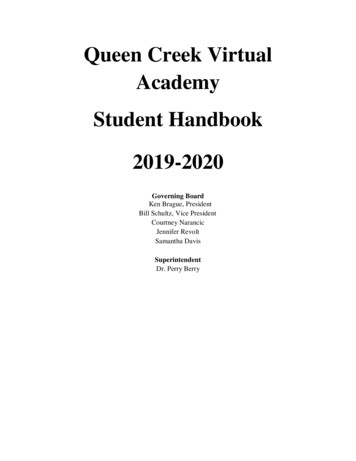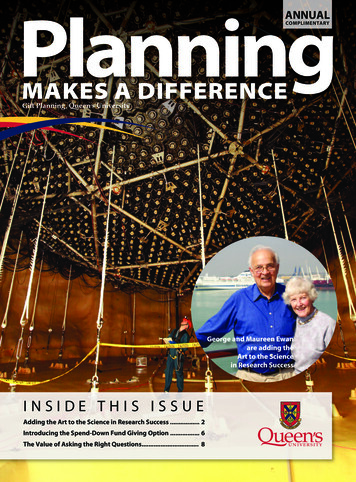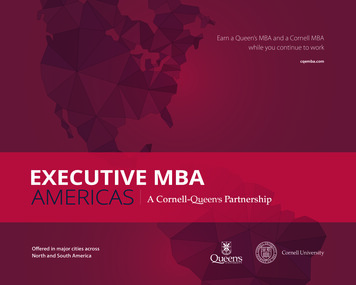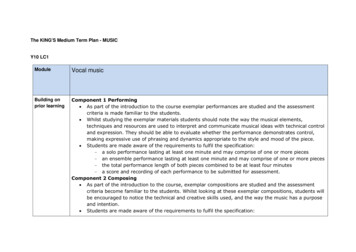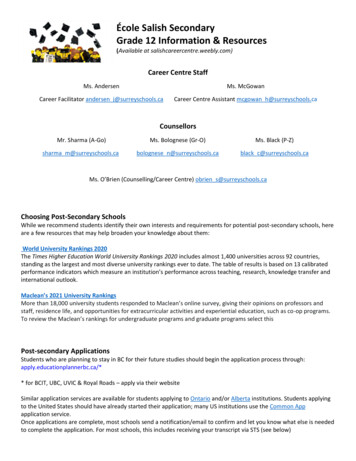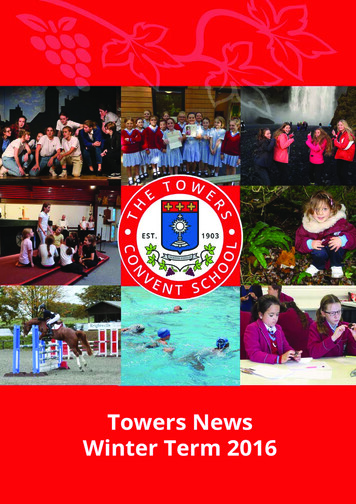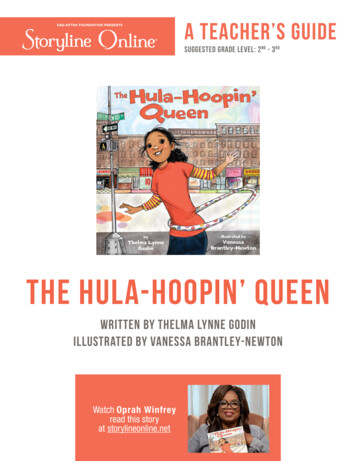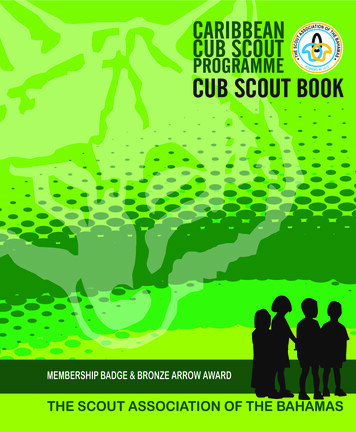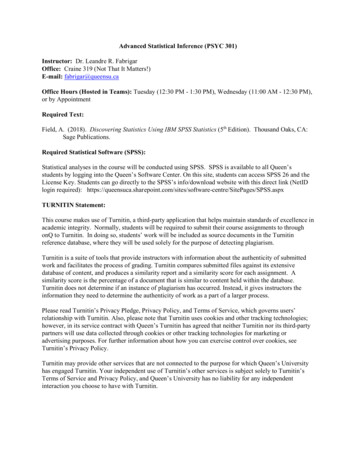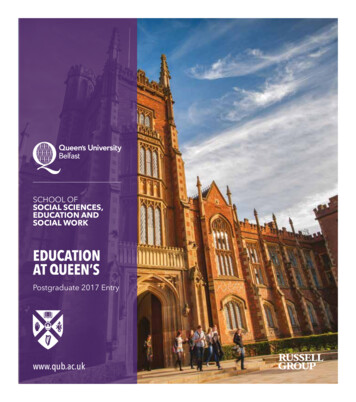
Transcription
SCHOOL OFSOCIAL SCIENCES,EDUCATION ANDSOCIAL WORKEDUCATIONAT QUEEN’SPostgraduate 2017 Entrywww.qub.ac.uk
BE PART OF A HUBTRANSFORMINGLIVESOUR DEGREE PROGRAMESGO.QUB.AC.UK/PG-EDUCATIONTAUGHTApplied Behaviour AnalysisAutism Spectrum DisordersChildren’s RightsEducational LeadershipEducational StudiesInclusion and Special Needs EducationPostgraduate Certificate in Education (PGCE)Teaching English to Speakers of Other Languages (TESOL)PROFESSIONAL DOCTORATEDoctorate in EducationRESEARCHEducation2Education is studiedboth as a preparation forteaching in schools andas an important area ofacademic and professionalactivity. Northern Irelandprovides a unique teachingexperience particularlyin post-primary schools(grammar, secondary andspecial schools).
WHY STUDY EDUCATIONAT QUEEN’S?Queen’s offers a number of uniqueopportunities eg a placement for PGCEstudents which provides them withinvaluable real-world experience.We offer an economically attractiveApplied Behaviour Analysis course asonline/blended delivery of the contentallows UK/EU/international students toparticipate without relocation.The Inclusion and Special EducationalNeeds course is attuned specifically toraising awareness, addressing issuesspecifically related to working withchildren with special educational needs,increasing knowledge of concepts andmodels of inclusion and evidence-basedinterventions.Education at Queen’s – 2017 EntryThrough the Master’s-level TESOLprogramme students will gain thenecessary knowledge and skills to deviseand teach effective English Languagecourses, and the essential research andanalytical skills to keep up with the rapiddevelopments in the field.Graduates find employment in teaching,community and development work,government and in social services.3
TAUGHT PROGRAMMESAPPLIED BEHAVIOURANALYSIS(MSC, PGDIP)Entrance RequirementsA 2.1 Honours degree or above orequivalent qualification acceptable tothe University in any subject disciplineplus one year of experience in anApplied Behaviour Analysis (ABA)related context and access to an ABArelated working environment.Applicants with a 2.2 Honours degreeor equivalent qualification acceptable tothe University may also be consideredif they have at least two years ofexperience in an ABA related contextand access to an ABA related workingenvironment.International Qualifications*Taken within the last 2 years.For more information on EnglishLanguage requirements for EEA andnon-EEA nationals see: go.qub.ac.uk/EnglishLanguageReqsNormally self-funded, although theSchool may offer a limited number ofscholarships.For fees and funding information pleasesee:Fees: qub.ac.uk/TuitionFeesFunding: go.qub.ac.uk/pgfunding1 year full-time or 2*-3 years part-time.Individual modules may be studied as ashort course.Additional Informationfor International StudentsStudents can study at the time of theirconvenience within pre-determineddaily or weekly periods.4UK/EU Fees: 5,500International Fees: 15,200Duration* Subject to specific Universityregulations.Evidence of an IELTS* score of 6.5, withnot less than 5.5 in any component, oran equivalent qualification acceptable tothe University is required.Fees and Funding1If you need to improve your Englishlanguage skills before your study, ourpartner INTO Queen’s University Belfastoffers a range of English languagecourses; see www.intohigher.com/qubFor information on internationalqualification equivalents, please seego.qub.ac.uk/YourCountryInternational students wishing to applyto Queen’s University Belfast (and forwhom English is not their first language),must be able to demonstrate theirproficiency in English in order to benefitfully from their course of study orresearch. Non-EEA nationals must alsosatisfy UK Visas and Immigration (UKVI)immigration requirements for Englishlanguage for visa purposes.17.5 hours online delivery, 5 or 2.5 hoursface-to-face seminar per 20 CATS pointmodule.Teaching TimesThe programme content is deliveredonline with multiple focused weeklyvirtual interactions that include peerand tutor feedback. This structureallows for acquisition of knowledge,information sharing, and developmentof critical thinking skills, as well as givingand receiving immediate feedback.An intensive, on-campus, one-day orhalf-day consolidation workshop takesplace once during each module to givestudents the opportunity to meet eachother and course tutors face-to-face.1Postgraduate Taught tuition fees for UK/EU studentsfor 2017-18 are proposed at time of print; pleaserefer to website for further information. PostgraduateResearch tuition fees for UK/EU students will beset in early 2017; please refer to website for furtherinformation. See qub.ac.uk/TuitionFeesEducation at Queen’s – 2017 Entry
“The MSc in Applied Behaviour Analysis is a highly flexibleprogramme that responds to current professionals’ andstudents’ needs for an evidence-based education thatis readily applicable with a range of populations. Theprogramme offers great opportunities for professionaldevelopment as well as a solid basis of research skills thatcan lead to a doctorate in the area of ABA.”Dr Katerina Dounavi, Lecturer. Programme DirectorOVERVIEWBehaviour analysis has been recognisedas the basis for medically necessaryintervention and educational provision forindividuals with Autism Spectrum Disorders.With the growing prevalence of AutismSpectrum Disorders (now estimated to be1:88), behaviour analysis has experienceda significant rise in popularity. There areover 13,000 Board Certified BehaviorAnalysts (BCBAs) worldwide and thisnumber is predicted to rise given thatprofessional approval is seen as the keyto delivering high quality services toindividuals, families, in schools and inrelated settings. Furthermore, behaviouranalysis is increasingly being applied togeneral education, special education andorganisational leadership settings.This MSc is a highly interactive blendedlearning programme providing professionalsfrom a wide range of backgrounds withscientifically validated expertise that isapplicable to mainstream and special needseducation, inclusion, curriculum, learning,and pedagogy.This programme should be of interest toprofessionals wishing to become BCBAs,to those in the ‘helping’ professions (egteachers, speech/language therapists,occupational therapists, psychologists) andstudents preparing for PhD studies.Education at Queen’s – 2017 EntryThe Centre for Behaviour Analysis is wellconnected both locally and internationallyand unique project and employmentopportunities arise on a regular basis.CONTENTStudents may enrol on a full-time (1 year)or part-time (2 or 3 years) basis. Individualmodules may be studied as a short course.Part-time students typically complete oneor two modules per semester. Full-timestudents typically complete three modulesper semester.The MSc is awarded to students whosuccessfully complete six taught modules(120 CATS) and a 15,000-20,000 worddissertation (60 CATS) as well as audit ‘AnIntroduction to Research Methods: Children,Young People and Education’ onlinemodule in Semester 2.Students may exit with a PostgraduateDiploma in Applied Behaviour Analysis bysuccessfully completing 120 CATS pointsfrom taught pathway modules.Modules (20 CATS) Assessment in Behaviour Analysis Concepts and Principles of BehaviourAnalysis Ethical and Professional Conduct Evaluation in Behaviour Analysis Fundamental Elements of BehaviourChange5
Students are expected to audit ‘AnIntroduction to Research Methods: Children,Young People and Education’ onlinemodule in Semester 2.ASSESSMENTModules are assessed by a variety ofmethods, eg multiple choice tests, essays,project reports, and contributions to anonline discussion forum.CAREERSThe majority of students are already inrelevant jobs and the job market is healthyfor BCBAs at present. Professionals whoare certified BCBAs have the skills andknowledge to develop, implement andevaluate quality interventions that help toproduce positive behavioural changes in arange of settings.Typically, behaviour analysts work inthe ‘helping’ professions (eg teachers,speech/language therapists, occupationaltherapists, psychologists). Increasingly,jobs advertised for behaviour managers orspecialists require BCBA status and thereis a demand for BCBAs in Europe andworldwide, especially in North America.Teachers, as well as allied healthprofessionals, should find this degreebeneficial in their workplace.WHY QUEEN’S?BACB RecognitionThe Behavior Analyst Certification Board(BACB) has approved the six core modulesof this course sequence, which covers thecurriculum as outlined in the 4th Task List(www.bacb.com).Students who successfully completean approved course sequence, have aMaster’s degree and have fulfilled practicerequirements are eligible to take the BACBCertification exam and become BCBAs. Theexam is a four-hour/160 question MultipleChoice Test (check www.bacb.com for moredetails) and preparation for taking multiplechoice tests is an integral part of the MScABA assessment structure.The BCBA qualification is internationallyrecognised and endorsed. BACB practicerequirements will not be included in thisprogramme; however, the Centre forBehaviour Analysis has close links withinternational service and placementproviders, and can provide contacts forsupervised placements that fulfil the BACBpractice requirements.FLEXIBILITYThis MSc is designed to meet the needs oflocal and international professionals and isdelivered via blended learning. A Diplomaoption is also available.APPLY NOWgo.qub.ac.uk/pgapplyCONTACTGillian BeavisSchool of Social Sciences, Educationand Social Workt: 44 (0)28 9097 5923e: g.beavis@qub.ac.ukqub.ac.uk/ssesw6Education at Queen’s – 2017 Entry
AUTISMSPECTRUMDISORDERS(MSC, PGDIP, PGCERT)Entrance RequirementsA 2.1 Honours degree or above orequivalent qualification acceptable tothe University in any subject discipline.Applicants with a 2.2 Honoursdegree or equivalent qualificationacceptable to the University may alsobe considered if they have at least twoyears of professional experience in aneducation, training or relevant context.International QualificationsFor information on internationalqualification equivalents, please seego.qub.ac.uk/YourCountryAdditional Informationfor International StudentsInternational students wishing toapply to Queen’s University Belfast(and for whom English is not theirfirst language), must be able todemonstrate their proficiency inEnglish in order to benefit fully fromtheir course of study or research.Non-EEA nationals must also satisfyUK Visas and Immigration (UKVI)immigration requirements for Englishlanguage for visa purposes.Evidence of an IELTS* score of 6.5, withnot less than 5.5 in any component, oran equivalent qualification acceptableto the University is required.If you need to improve your Englishlanguage skills before your study,our partner INTO Queen’s UniversityBelfast offers a range of Englishlanguage courses; see www.intohigher.com/qubDuration1 year full-time or up to 3 yearspart-time. Individual modules may bestudied as short courses.Teaching TimesFull-day workshops and online.Some of the modules are taught in3-day block workshops on campus andsome are taught entirely online. Thereis no weekly attendance requirement.Fees and Funding1UK/EU Fees: 5,500International Fees: 15,200Normally self-funded, although theSchool may offer a limited number ofscholarships.For fees and funding informationplease see:Fees: qub.ac.uk/TuitionFeesFunding: go.qub.ac.uk/pgfundingEducation at Queen’s – 2017 EntryThis MSc was developed in consultationwith the education, health and social care,and voluntary sectors, as well as individualsaffected by Autism Spectrum Disorder(ASD), and is designed to facilitate theprofessional development of teachers andother related professionals who work, orwish to work, in this area. Students explorethe theories and practice underpinning ASDand can engage in associated experientialwork.In line with the needs identified in theNorthern Ireland Executive’s Autism Strategy(2013-2020) and associated Action Plan,the course has been attuned to raisingawareness, addressing issues specificallyrelated to children and adults on the autismspectrum, and increasing knowledgeand skills in relation to evidence-basedinterventions.The aim is to enable the study of the theoryand practice underpinning the specialistarea in order to enhance understanding andability to engage in research- and evidencebased practice.On completion of the degree, students willhave: developed a breadth of knowledgeand understanding of the special needsof children, young people and adultsdiagnosed with ASD*Taken within the last 2 years.For more information on EnglishLanguage requirements for EEA andnon-EEA nationals raduate Taught tuition fees for UK/EU studentsfor 2017-18 are proposed at time of print; pleaserefer to website for further information. PostgraduateResearch tuition fees for UK/EU students will beset in early 2017; please refer to website for furtherinformation. See qub.ac.uk/TuitionFees shown evidence of critical reflection ontheir professional practice and be able toapply relevant research literature to bothpersonal and professional experience7
acquired a range of specialised practicalskills which will enhance their ability tosupport pupils and students in a variety ofsettings developed teamwork skills required towork in partnership, supporting andadvising other colleaguesCONTENTThe MSc is awarded to students whosuccessfully complete six taught modules(120 CATS) and a 15,000-20,000 worddissertation (60 CATS). Exit qualificationsare available: students may exit with aPostgraduate Diploma by successfullycompleting 120 CATS points from taughtpathway modules or a PostgraduateCertificate by successfully completing 60CATS points from taught pathway modules.We’ve made it easy to study for a Master’smodule as a short course. If you would liketo apply for a short course, please contactthe Education Secretary (contact detailsbelow) for advice.Modules (20 CATS) An Introduction to Research Methods:Children, Young People and Education(online) Fundamental Elements of BehaviourChange (online/1/2-day workshop) Understanding Adults with ASD (3-dayworkshop/online) Understanding Children with ASD (3-dayworkshop/online)CAREERSGraduates from this degree have found itbeneficial in their workplace when advisingcolleagues, influencing policy makers andsupporting pupils and students with autismand their families, or seeking professionalpromotion or diversification. Othersprogress to doctoral-level studies andresearch or teaching.WHY QUEEN’S?Flexibility: this programme is designedto meet the needs of professionals and isdelivered via blended and online learning.Diploma and Certificate options are alsoavailable.Innovation: some modules of theprogramme are based on the BehaviorAnalyst Certification Board (BACB) Task Lists(eg Fundamental Elements of BehaviourChange).Employability: the programme providesa range of specialised practical skillsfor teaching and supporting pupils andstudents in a variety of settings; theteamwork skills needed to support andadvise colleagues; and, the knowledgeand understanding of the special needs ofindividuals with ASD.“The MSc ASD is aimed atprofessionals working inthe fields of education,health, and social care witha specific focus on autismspectrum and special needs.The course is suitablefor staff who work withchildren and adolescents aswell as adults on the autismspectrum. This programmeis unique in NorthernIreland and Ireland and thecourse structure is designedto ensure that it is easilyaccessible for students fromfurther afield (no need toleave your job or relocateto Belfast!). Employerswelcome skilled and wellinformed staff who havecompleted the MSc in ASDfrom Queen’s.”Professor Karola DillenburgerTwo optional modules may be chosen fromthe Educational Studies (MEd) programme.See page 13 and our online Course Finder.ASSESSMENTModules are assessed by a varietyof assessment methods, eg writtenassignments, project reports, online multiplechoice tests, or weekly contributions toonline fora. Active student participation isrequired for all modules.8APPLY NOWgo.qub.ac.uk/pgapplyCONTACTGillian BeavisSchool of Social Sciences, Educationand Social Workt: 44 (0)28 9097 5923e: g.beavis@qub.ac.ukqub.ac.uk/sseswEducation at Queen’s – 2017 Entry
CHILDREN’SRIGHTS(MSC, PGDIP, PGCERT)Entrance RequirementsIf you need to improve your Englishlanguage skills before your study,our partner INTO Queen’s UniversityBelfast offers a range of Englishlanguage courses; see www.intohigher.com/qubA 2.1 Honours degree or above orequivalent qualification acceptable tothe University in any subject discipline.Applicants with a 2.2 Honoursdegree or equivalent qualificationacceptable to the University may alsobe considered if they have at leasttwo years of professional experiencein an education, training or relevantcontext.Duration1 year full-time. Individual modulesmay be studied as short courses.Teaching TimesInternational QualificationsA combination of face-to-face sessionsand online learning formats.For information on internationalqualification equivalents, please seego.qub.ac.uk/YourCountryFees and Funding1UK/EU Fees: 5,500International Fees: 15,200Additional Informationfor International StudentsNormally self-funded, although theSchool may offer a limited number ofscholarships.International students wishing toapply to Queen’s University Belfast(and for whom English is not theirfirst language), must be able todemonstrate their proficiency inEnglish in order to benefit fully fromtheir course of study or research.Non-EEA nationals must also satisfyUK Visas and Immigration (UKVI)immigration requirements for Englishlanguage for visa purposes.For fees and funding informationplease see:Fees: qub.ac.uk/TuitionFeesFunding: go.qub.ac.uk/pgfundingEvidence of an IELTS* score of 6.5, withnot less than 5.5 in any component, oran equivalent qualification acceptableto the University is required.Education at Queen’s – 2017 EntryThis MSc is linked to the Centre forChildren’s Rights (CCR), which has aninternational reputation in the area ofchildren’s rights with a focus on theimplementation of children’s rights, childparticipation, education, social care andthe children with disabilities. It will meetthe increasing demand for a postgraduatequalification in Children’s Rights, explicitlyfocused on interdisciplinary research andchild rights-based research methods.The aim of the programme is to providehigh-level knowledge and skills in children’srights law and practice of value to thoseworking with and for children, includingpublic officials and NGOs as well aseducators, social workers and health careproviders.The programme will develop participants’expertise in two distinct but interconnectedareas: Children’s Rights - using the UnitedNations Convention on the Rights of theChild and other relevant internationalstandards to evaluate the laws, policiesand practices which affect children Research with Children - evaluating thebest methods of conducting research intochildren’s lives with a particular focus onapproaches which involve children activelyin the research process.*Taken within the last 2 years.For more information on EnglishLanguage requirements for EEA andnon-EEA nationals raduate Taught tuition fees for UK/EU studentsfor 2017-18 are proposed at time of print; pleaserefer to website for further information. PostgraduateResearch tuition fees for UK/EU students will beset in early 2017; please refer to website for furtherinformation. See qub.ac.uk/TuitionFeesThe programme features input from leadinginternational children’s rights scholars atQueen’s and from around the world.9
CONTENTThis MSc is part of a suite of fourprogrammes in childhood studies offeredby the University. There are two shortcompulsory modules (10 CATS) which acrossall four programmes and which providestudents with an initial opportunity toconsider these four disciplinary perspectivesand to work with students and staff fromthese four areas.The MSc is awarded to students whosuccessfully complete 120 CATS points fromthe taught modules and a 15,000-20,000word dissertation (60 CATS points).Exit qualifications are available: studentsmay exit with a Postgraduate Diploma bysuccessfully completing 120 CATS pointsfrom taught modules or a PostgraduateCertificate by successfully completing 60CATS points from taught modules.Core modules An Introduction to Research Methods:Children, Young People and Education Childhood and Youth Research in Practice Children’s Rights in Research Foundations of Children’s Rights Perspectives on Childhood and Youthlevel skills in interdisciplinary research,participatory research methods andknowledge of children’s rights. Professionalswithin children/human rights-focusedNGOs, public officials, educators, socialworkers and health professionals whowork with children should find this degreebeneficial.The MSc is a good foundation for studentswishing to pursue their own researchthrough Doctoral study.WHY QUEEN’S?Blended Learning: the programme isdesigned to meet the needs of local andinternational professionals and is deliveredvia blended and online learning.Choice: the programme has been designedto enable students to pursue individualinterests and to maximise the range ofmodules available to students.“The best thing aboutstudying Children’s Rightsat Queen’s is that it providesyou with the opportunity toreflect on your professionalpractice with academics whoare leaders in their field.This has equipped me toreturn to my workplace andbe a better informed andmore analytical practitioner.I have taken the learningfrom this course andapplied it directly intomy professional practicewith positive outcomesfor service users andcolleagues.”Gerry Marshall, Children’s Services InspectorOptional modules include Children’s Rights and Conceptions ofChildhood Education, the Law and Children’sRights Qualitative Research in Childhoodand YouthASSESSMENTThere are no written examinations. Avariety of assessment methods will be usedincluding assignments, online tests andparticipation in workshops. Students will havethe option of undertaking research work forexternal organisations to submit as part oftheir dissertation.CAREERSThere is increasing demand for high-10APPLY NOWgo.qub.ac.uk/pgapplyCONTACTGillian BeavisSchool of Social Sciences, Educationand Social Workt: 44 (0)28 9097 5923e: g.beavis@qub.ac.ukqub.ac.uk/sseswEducation at Queen’s – 2017 Entry
EDUCATIONALLEADERSHIP(MSC, PGDIP, PGCERT)Entrance RequirementsA 2.1 Honours degree or above orequivalent qualification acceptable tothe University in any subject discipline.Applicants with a 2.2 Honoursdegree or equivalent qualificationacceptable to the University may alsobe considered if they have at leasttwo years of professional experiencein an education, training or relevantcontext.For more information on EnglishLanguage requirements for EEA andnon-EEA nationals see:go.qub.ac.uk/EnglishLanguageReqsIf you need to improve your Englishlanguage skills before your study,our partner INTO Queen’s UniversityBelfast offers a range of Englishlanguage courses; seewww.intohigher.com/qubInternational QualificationsDurationAdditional Informationfor International StudentsTeaching TimesFor information on internationalqualification equivalents, please seego.qub.ac.uk/YourCountryInternational students wishing toapply to Queen’s University Belfast(and for whom English is not theirfirst language), must be able todemonstrate their proficiency inEnglish in order to benefit fully fromtheir course of study or research.Non-EEA nationals must also satisfyUK Visas and Immigration (UKVI)immigration requirements for Englishlanguage for visa purposes.1 year full-time or up to 3 yearspart-time. Individual modules may bestudied as short courses.Evening, through a combinationof face-to-face sessions and onlinelearning formats.Fees and Funding1UK/EU Fees: 5,500International Fees: 15,200For fees and funding informationplease see:Fees: qub.ac.uk/TuitionFeesFunding: go.qub.ac.uk/pgfundingEvidence of an IELTS* score of 6.5, withnot less than 5.5 in any component, oran equivalent qualification acceptableto the University is required.OVERVIEWIn the current climate of structural andpolitical pressure on improving educationalperformance and opportunities, there is anincreased focus upon the quality of leadershipwithin educational institutions. This MScrecognises that a high-quality educationalsystem depends on leaders from all walksof life and all types of positions, regardlessof title. It is intended, therefore, to provideleadership development for people whowork in all manner of roles in the educationalsystem: classroom teachers, formalschool leaders, local authority personnel,policymakers, and any individual with a directinterest in the primary and post-primary schoolsectors.The programme aspires to equip students withthe necessary knowledge, skills, and creativecapacity to respond to a variety of leadershipchallenges faced in contemporary educationalinstitutions. It challenges traditional notionsof ‘leaders’ and ‘leadership’ pointing to new,more collaborative and more organic modelsof leading. It is expected that graduates willbe able to inform their professional practicewith the latest research evidence in the field tonurture meaningful relationships in educationalcommunities, address issues of equity anddiversity, support teaching and learning, andultimately ensure quality outcomes which aretailored to contextual needs.*Taken within the last 2 years.1Education at Queen’s – 2017 EntryPostgraduate Taught tuition fees for UK/EU studentsfor 2017-18 are proposed at time of print; pleaserefer to website for further information. PostgraduateResearch tuition fees for UK/EU students will beset in early 2017; please refer to website for furtherinformation. See qub.ac.uk/TuitionFees11
CONTENTCAREERSExit qualifications are available: studentsmay exit with a Postgraduate Diploma bysuccessfully completing 120 CATS pointsfrom taught modules or a PostgraduateCertificate by successfully completing 60CATS points from taught modules.WHY QUEEN’S?The MSc is awarded to students who havesuccessfully completed six taught modules(120 CATS points) and a 15,000–20,000word dissertation (60 CATS points).We’ve made it easy to study for a Master’smodule as a short course. If you would liketo apply for a short course, please contactthe Education Secretary (contact detailsbelow) for advice.Compulsory modules (20 CATS) Leadership Theory and Practice Leadership for Change School Effectiveness and SchoolImprovement An Introduction to Research Methods:Children, Young People and EducationOptional modules may be chosen from theEducational Studies (MEd) programme. Seepage 13 and our online Course Finder.ASSESSMENTGraduates have found this degree beneficialfor improving leadership practice in theirworkplace. Others have found it beneficial inexpanding the roles they undertake at work,and gaining employment or promotion.Some progress to doctoral-level studies andresearch. Active student involvement in sessions(student-led sessions) Assignments tailored to topics of interestto each individual student Research-led teaching International outlook on leadership issues Interdisciplinary approach Blended learning format Online discussions and debates Small group work and presentations International mix of students enablingexchanges of knowledge, experience, andperspectives World-class teaching/facilitiesCredit TransferStudents who have completed theProfessional Qualification for Headship(PQH) degree within the last 10 years areeligible to credit transfer (up to 30 M-levelcredits towards the taught modules).There are no written examinations. Modulesare assessed by coursework, which includeswritten assignments and group presentationprojects.The credit transfer application must besubmitted at the same time as the onlineprogramme application as retrospectiveapplications are not accepted.We seek to develop in students the abilityto critique current leadership practicesand to enact changes that will improveeducation for all.FlexibilityThe programme is tailored to workingprofessionals. It is partly delivered online,while face-to-face teaching sessionstake place in the evenings to facilitateattendance. Part-time students can remainin their workplace during their studiesand directly apply new knowledge in theirsettings.“Rather than offering ‘howto-do’ type of knowledgeor quick-fix solutionsto common leadershipproblems, the coursepromotes critical andcreative thinking amongstudents, bringing to lightand questioning manylong–held assumptions.This is achieved throughextended periods ofacademic study andinsightful dialogues withprofessional peers.”Dr Stefania Giannakaki“I have acquired knowledgeabout educationalleadership theory andpractice that I can apply inmy school in Kazakhstan asa leader and as a teacher.”Nurbolat Bissengaliyev, graduateAPPLY NOWgo.qub.ac.uk/pgapplyCONTACTGillian BeavisSchool of Social Sciences, Educationand Social Workt: 44 (0)28 9097 5923e: g.beavis@qub.ac.ukqub.ac.uk/ssesw12Education at Queen’s – 2017 Entry
EDUCATIONALSTUDIES(MED, PGDIP, PGCERT)Entrance RequirementsIf you need to improve your Englishlanguage skills before your study,our partner INTO Queen’s UniversityBelfast offers a range of Englishlanguage courses; see www.intohigher.com/qubA 2.1 Honours degree or above orequivalent qualification acceptable tothe University in any subject discipline.Applicants with a 2.2 Honoursdegree or equivalent qualificationacceptable to the University may alsobe considered if they have at leasttwo years of professional experiencein an education, training or relevantcontext.Duration1 year full-time or 3 years part-time.Individual modules may be studied asshort courses.
The Behavior Analyst Certification Board (BACB) has approved the six core modules of this course sequence, which covers the curriculum as outlined in the 4th Task List (www.bacb.com). Students who successfully complete an approved course sequence, have a Master's degree and have fulfilled practice requirements are eligible to take the BACB
